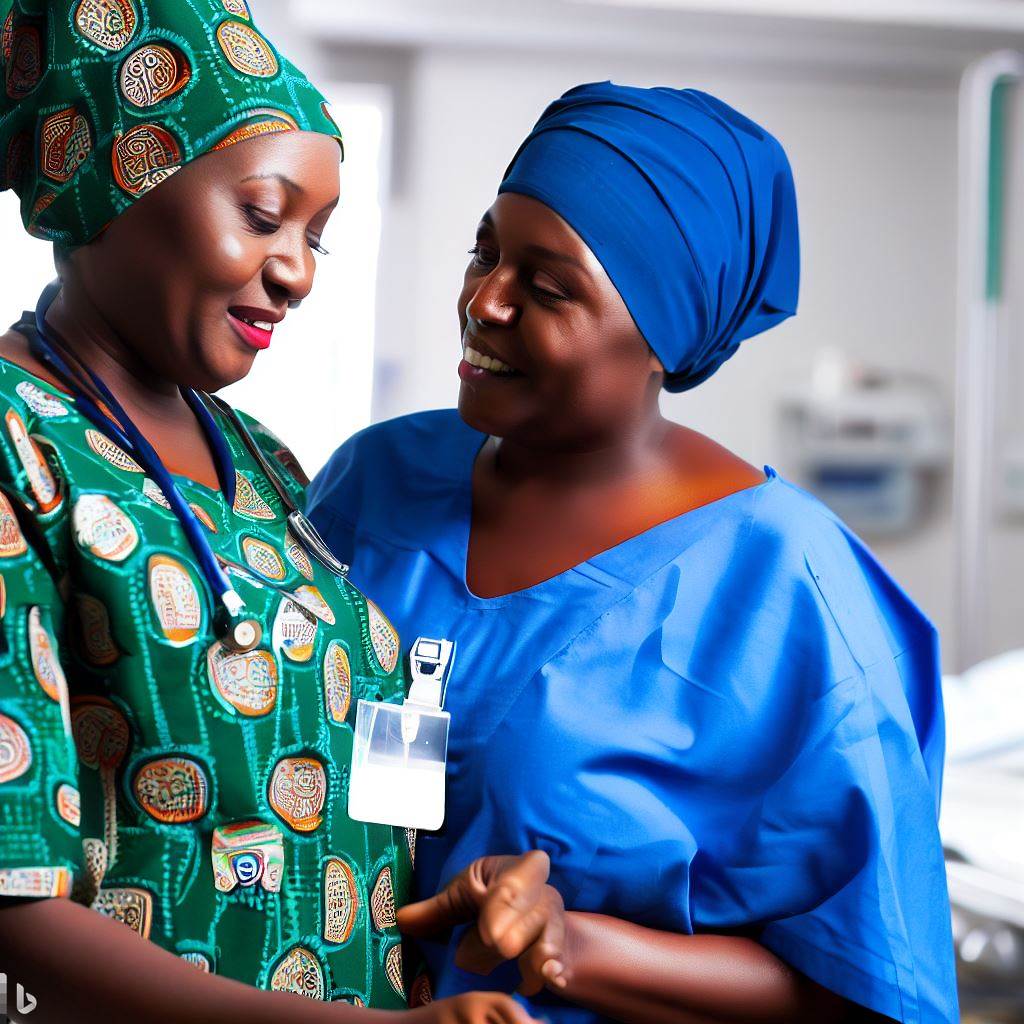Introduction
Nurse midwives play a crucial role in the healthcare system, particularly in providing specialized care for women during pregnancy, childbirth, and postpartum.
In Nigeria, nurse midwife education is an essential component in preparing healthcare professionals to deliver quality maternal and newborn care.
Nurse midwives are vital in healthcare systems due to their expertise in providing comprehensive care for women.
They provide antenatal care, monitor fetal development, assist in labor and delivery, and offer postpartum support.
In Nigeria, nurse midwife education involves a rigorous training program that equips healthcare professionals with the necessary skills and knowledge.
This education is typically offered at tertiary institutions and includes theoretical and practical components.
The training curriculum covers topics such as anatomy and physiology, reproductive health, prenatal and postnatal care, newborn care, and emergency obstetric care.
Students also gain practical experience through clinical rotations in various healthcare settings.
Furthermore, nurse midwife education in Nigeria emphasizes the importance of cultural competence and ethical practice.
Graduates are equipped to provide care that takes into account the diverse cultural backgrounds and beliefs of their patients.
Nurse midwife education plays a vital role in improving maternal and newborn health outcomes in Nigeria.
It ensures that healthcare professionals have the necessary skills and knowledge to provide safe and quality care to women during pregnancy, childbirth, and the postpartum period.
In fact, nurse midwife education in Nigeria is essential for enhancing the healthcare system’s capacity to provide comprehensive and specialized care for women.
Through a rigorous curriculum and practical experience, healthcare professionals are prepared to meet the unique needs of women during the reproductive journey.
Educational Requirements
Academic qualifications needed to become a nurse midwife
A high school diploma or GED is the first step in the educational journey towards becoming a nurse midwife.
Transform Your Career in Nigeria
Discover unmatched expertise with our personalized Career Consulting service. Navigate Nigeria’s job market with a strategy tailored just for you.
Get StartedApplicants must possess a Bachelor of Science in Nursing (BSN) degree from an accredited nursing program.
Some nursing midwifery programs may require a specific grade point average (GPA) for admission.
Completion of prerequisite courses such as anatomy, physiology, microbiology, psychology, and nutrition is essential.
Additional requirements may include immunization records, background checks, and drug screenings.
General nursing education prerequisites
Enrollment in a nursing program requires meeting general prerequisites set forth by the nursing institution.
These prerequisites may include meeting a minimum GPA, submitting letters of recommendation, and obtaining a competitive score on entrance exams.
Some nursing schools may also require completion of prerequisite science courses like biology and chemistry.
Clinical experience in a healthcare setting, such as volunteering or working as a nursing assistant, is advantageous.
Completion of basic life support (BLS) certification is usually mandatory for nursing students.
Specialized midwifery training and certifications
After obtaining a nursing degree, aspiring nurse midwives must enroll in a specialized midwifery program.
These programs are designed to provide advanced training and education specific to the field of midwifery. Curriculum usually includes didactic coursework, clinical rotations, and hands-on experiences.
Upon completion of the midwifery program, graduates are eligible to take the national certification exam. The American Midwifery Certification Board (AMCB) offers the Certified Nurse-Midwife (CNM) certification.
Some states may also require nurse midwives to obtain additional state certifications or licensure.
Overall, becoming a nurse midwife in Nigeria requires a solid educational foundation in nursing and midwifery.
The combination of academic qualifications, general nursing education prerequisites, and specialized midwifery training prepares individuals for a successful career in this healthcare profession.
It is important for aspiring nurse midwives to research and select accredited programs to ensure eligibility for certification and licensure in Nigeria.
Read: Balancing Work and Life as a Doctor in Nigeria
Nursing Programs in Nigeria
Nursing programs in Nigeria offer diverse courses, combining classroom-based learning and practical training to prepare individuals for a nurse midwife career.
Accredited institutions ensure quality nurse midwife education and certification in Nigeria.
Programs available include the Basic Nursing Program (3 years), training students to become registered nurses in anatomy, physiology, pharmacology, and community health nursing.
The Post-Basic Nursing Program (1-2 years) is for registered nurses seeking specialization, like midwifery, with advanced knowledge in obstetrics and gynecology.
The Bachelor of Science Nursing Program (4 years) combines theory and practice, producing well-rounded nurses competent in medical-surgical, mental health, and pediatric nursing.
Accredited institutions offering nurse midwife education include the University of Lagos, University of Nigeria, University of Ibadan, School of Nursing (University College Hospital, Ibadan), and School of Nursing (Obafemi Awolowo University).
Nursing program durations vary: Basic Nursing (3 years), Post-Basic Nursing (1-2 years), Bachelor of Science Nursing (4 years).
Publish Your Professional Profile, Business or Brand
Showcase your expertise, gain trust, and boost visibility instantly on Professions.ng.
Publish NowThe curriculum equips students with necessary knowledge and skills, covering nursing concepts, healthcare ethics, and evidence-based practice.
Overall, Nigerian nursing programs provide diverse training for aspiring nurse midwives. Accredited institutions ensure quality education, preparing students for fulfilling healthcare careers.
Program durations and curricula vary, but all aim to produce competent and compassionate nurse midwives contributing to Nigeria’s healthcare system.
Read: Importance of Nurse Midwives in Nigeria’s Healthcare System
Midwifery Training Programs
Nurse midwife education in Nigeria includes comprehensive training programs, covering theory-based courses and practical training.
The curriculum encompasses anatomy, physiology, pharmacology, antenatal care, labor, delivery, and postpartum care. Practical training is conducted in hospitals under experienced midwives’ guidance.
It provides valuable hands-on experience in delivering babies and prenatal/postnatal care, enhancing students’ capabilities and confidence.
Critical skills, like assessing fetal well-being and managing postpartum hemorrhage, are developed.
The programs combine classroom instruction, simulations, and clinical rotations. During clinical rotations, students interact with patients, improve communication skills, and apply theoretical knowledge.
Ethical and legal practices, cultural sensitivity, and diversity-respecting care are emphasized.
Upon completion, graduates can take the licensing examination by the Nursing and Midwifery Council of Nigeria.
Successful candidates become certified nurse midwives, capable of independent practice or as part of healthcare teams.
Continuing education is encouraged to stay updated with current practices and advancements.
These programs play a vital role in meeting healthcare needs, especially in rural areas with high maternal and infant mortality rates.
All in all, Nigerian midwifery training offers comprehensive education through theory and practice. Students gain hands-on experience, essential for their development.
Ethical, cultural, and legal aspects are taught. Graduates become certified nurse midwives and can improve healthcare outcomes.
Read: How Nigerian Doctors are Combating Local Health Crises
Clinical Rotations
Clinical rotations play a crucial role in nurse midwife education by providing hands-on experience and practical training opportunities.
These rotations allow students to apply their classroom knowledge to real-life situations and enhance their clinical skills.
Role of clinical rotations in nurse midwife education
- Application of theoretical knowledge in practical settings.
- Development of clinical skills and expertise in providing midwifery care.
- Exposure to diverse patient populations, healthcare settings, and medical conditions.
- Opportunity to observe and learn from experienced healthcare professionals.
- Integration of critical thinking, decision-making, and problem-solving abilities.
Types of healthcare settings for clinical practice
Nurse midwife students undergo clinical rotations in various healthcare settings to gain a comprehensive understanding of different practice areas.
Some common settings include:
- Hospitals: Both private and public hospitals offer opportunities for clinical practice.
- Maternity clinics: Specialized clinics that focus on prenatal, antenatal, and postnatal care.
- Community health centers: Facilities providing primary healthcare services to local communities.
- Rural healthcare centers: Settings that cater to the healthcare needs of rural populations.
- Birth centers: Facilities that support natural childbirth in a homely environment.
Skills and knowledge gained through clinical rotations
Clinical rotations provide nurse midwife students with valuable skills and knowledge necessary for their future roles in delivering maternal and newborn care.
Some key areas of development during clinical rotations include:
- Assessment and monitoring of maternal and fetal well-being throughout pregnancy.
- Identification and management of high-risk pregnancies and childbirth complications.
- Providing emotional support and counseling to expectant mothers and their families.
- Performing various antenatal and postnatal procedures, such as administering vaccines and conducting newborn screenings.
- Collaborating with an interdisciplinary healthcare team to ensure comprehensive care.
- Developing effective communication and interpersonal skills to establish rapport with patients.
- Applying evidence-based practices and clinical guidelines in midwifery care.
- Enhancing cultural sensitivity and understanding to address diverse patient needs.
- Acquiring proficiency in using medical equipment and technology relevant to midwifery practice.
- Building critical thinking and problem-solving skills in complex healthcare situations.
In a nutshell, clinical rotations are an essential component of nurse midwife education in Nigeria.
They provide students with invaluable hands-on experience, enabling them to develop necessary skills, knowledge, and competencies required to deliver comprehensive midwifery care.
Through exposure to diverse healthcare settings and patient populations, these rotations prepare future nurse midwives to meet the challenges of providing safe and effective care to expectant mothers and newborns.
Read: Local Marketing Strategies for Nigerian Massage Therapists

Continuing Education and Professional Development
Continuing education and professional development are vital for nurse midwifery, given the ever-evolving nature of healthcare.
Staying updated with current practices and research is crucial for nurse midwives to enhance their knowledge and skills, leading to better patient care.
Nurse midwives can pursue advanced courses in areas like high-risk pregnancies or lactation consultancy, offering specialized care and increasing their expertise.
They can also become clinical instructors or join research projects, fostering collaboration with other healthcare professionals for innovative practices and improved patient outcomes.
To maintain certifications such as Certified Nurse-Midwife (CNM) or Certified Midwife (CM), fulfilling continuing education requirements is necessary.
This ensures nurse midwives stay updated with the latest standards and practices, demonstrating their commitment to quality care and professionalism.
Continuing education comes in different forms, including workshops, conferences, online courses, and higher degrees.
Conferences offer networking and knowledge exchange with experts and colleagues. Workshops provide practical skills for immediate application in practice settings.
Online courses offer flexibility and convenience, allowing nurse midwives to learn at their pace.
Importance of continuous learning in nurse midwifery
Higher degrees, like Master of Science in Nursing or Doctor of Nursing Practice, provide in-depth knowledge and leadership skills.
In addition to formal education, self-directed learning and reflection are valuable. Nurse midwives can read research articles, participate in online forums, and join professional organizations for continued learning.
Continuous learning is essential for nurse midwives to provide excellent, evidence-based care. It ensures their competence and keeps them updated in their practice, leading to better patient outcomes.
By embracing continuing education and professional development, nurse midwives in Nigeria can enhance their skills, expand their knowledge, and provide the best possible care for their patients.
Publish Your Professional Profile, Business or Brand
Showcase your expertise, gain trust, and boost visibility instantly on Professions.ng.
Publish NowThese opportunities also open doors for leadership positions, research, and teaching roles, fostering a culture of excellence and continuous improvement in the field of nurse midwifery.
Read: Top Institutions to Study Phlebotomy in Nigeria
Challenges and Future Prospects
Challenges Faced in Nurse Midwife Education in Nigeria
- Inadequate funding for nurse midwife education programs.
- Lack of infrastructure and resources in nursing schools and midwifery training institutions.
- Shortage of qualified and experienced faculty members to teach nurse midwife courses.
- Inadequate access to clinical placement opportunities for students to gain practical experience.
- High student-to-faculty ratio, which affects the quality of education and individual attention.
- Outdated curriculum that does not align with current healthcare practices and advancements.
- Limited availability of research and evidence-based practices in nurse midwife education.
Efforts to Improve Nurse Midwifery Training
- Increased government investment in nurse midwife education programs to improve funding.
- Upgrading and improving infrastructure and resources in nursing schools and midwifery training institutions.
- Recruitment and retention of qualified and experienced faculty members.
- Partnering with healthcare facilities to increase clinical placement opportunities for students.
- Revision of curriculum to incorporate current healthcare practices and advancements.
- Promoting research and evidence-based practices in nurse midwife education through collaborations and funding.
- Enhancing continuing education programs for nurse midwives to update their knowledge and skills.
Future Prospects and Advancements in Nurse Midwife Education
Integration of technology into nurse midwife education to enhance teaching and learning processes. Development of online platforms for remote learning and access to educational resources.
Expansion of nurse midwife education programs to reach underserved areas and communities.
Collaborations with international organizations and institutions for knowledge exchange and capacity building.
Promotion of interdisciplinary education to enhance teamwork and collaboration in providing comprehensive care.
Advancement of research in nurse midwifery to contribute to evidence-based practices and improve patient outcomes.
Creation of mentorship programs for aspiring nurse midwives to enhance their professional development.
Ultimately, nurse midwife education in Nigeria faces various challenges, including inadequate funding, infrastructure, and faculty members.
Efforts are being made to improve the training through increased investment, infrastructure upgrades, and curriculum revisions.
The future prospects of nurse midwife education in Nigeria include the integration of technology, expansion of programs, interdisciplinary education, and research advancements.
With these advancements, the quality of nurse midwifery training can be enhanced, leading to competent and skilled professionals who can contribute to improving maternal and child healthcare in Nigeria.
Conclusion
In summary, nurse midwife education plays a crucial role in ensuring high-quality healthcare for women and newborns in Nigeria.
It equips healthcare professionals with the necessary knowledge and skills to provide comprehensive care during pregnancy, childbirth, and postpartum periods.
For aspiring nurse midwives in Nigeria, pursuing education in this field opens up a world of opportunities to make a significant impact on the lives of mothers and babies.
It provides a fulfilling career path that is both rewarding and challenging.
However, there is a need for continuous improvement in nurse midwife education in Nigeria.
Efforts should be made to enhance the curriculum, update teaching methodologies, and provide adequate resources and facilities for training.
Collaboration between healthcare institutions and educational bodies is essential to develop comprehensive programs that meet international standards.
It is crucial for policymakers, healthcare organizations, and stakeholders to prioritize investments in nurse midwife education.
This includes providing scholarships, grants, and incentives to attract more individuals to this profession.
Additionally, continuous professional development opportunities should be made accessible to practicing nurse midwives to ensure they stay up-to-date with the latest advancements in the field.
Generally, by investing in nurse midwife education and empowering aspiring nurse midwives, Nigeria can significantly improve maternal and neonatal healthcare outcomes.
Together, we can work towards a future where every woman has access to safe and competent midwifery care throughout their reproductive journey.




